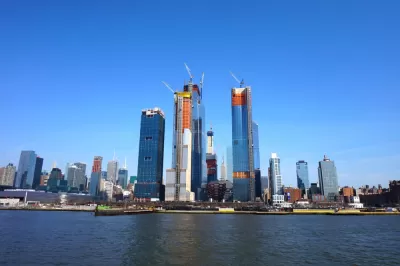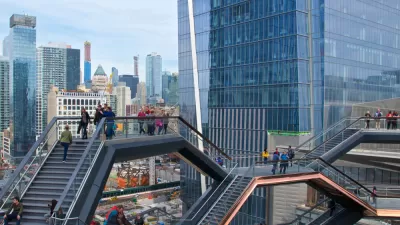The developers of the Hudson Yards development in New York want to change its deal with union employees as it moves into the second phase of construction.

Daniel Geiger reports: "The Related Cos., the developer behind the $20 billion Hudson Yards complex on the Far West Side, and the Building and Construction Trades Council of Greater New York, the umbrella union group that represents roughly 100,000 union construction workers, said Wednesday they have a framework to return to the bargaining table."
Geiger describes the feud leading up to the deal as bitter. "Related used union construction workers exclusively to build the first part of Hudson Yards, which is scheduled to formally open March 15. But the partnership fractured a year ago as Related sought to use some nonunion workers for the second phase."
Geiger details the acrimonious back and forth that ensued, which finally broke this week: "It wasn't immediately clear who blinked first, but the framework appears to grant Related leeway on a key issue: the freedom to hire less-expensive, nonunion workers for lower-skill jobs such as site cleanup."
FULL STORY: Hudson Yards deal ends nastiest fight in NYC real estate

Alabama: Trump Terminates Settlements for Black Communities Harmed By Raw Sewage
Trump deemed the landmark civil rights agreement “illegal DEI and environmental justice policy.”

Study: Maui’s Plan to Convert Vacation Rentals to Long-Term Housing Could Cause Nearly $1 Billion Economic Loss
The plan would reduce visitor accommodation by 25% resulting in 1,900 jobs lost.

Why Should We Subsidize Public Transportation?
Many public transit agencies face financial stress due to rising costs, declining fare revenue, and declining subsidies. Transit advocates must provide a strong business case for increasing public transit funding.

Paris Bike Boom Leads to Steep Drop in Air Pollution
The French city’s air quality has improved dramatically in the past 20 years, coinciding with a growth in cycling.

Why Housing Costs More to Build in California Than in Texas
Hard costs like labor and materials combined with ‘soft’ costs such as permitting make building in the San Francisco Bay Area almost three times as costly as in Texas cities.

San Diego County Sees a Rise in Urban Coyotes
San Diego County experiences a rise in urban coyotes, as sightings become prevalent throughout its urban neighbourhoods and surrounding areas.
Urban Design for Planners 1: Software Tools
This six-course series explores essential urban design concepts using open source software and equips planners with the tools they need to participate fully in the urban design process.
Planning for Universal Design
Learn the tools for implementing Universal Design in planning regulations.
Smith Gee Studio
Alamo Area Metropolitan Planning Organization
City of Santa Clarita
Institute for Housing and Urban Development Studies (IHS)
City of Grandview
Harvard GSD Executive Education
Toledo-Lucas County Plan Commissions
Salt Lake City
NYU Wagner Graduate School of Public Service




























